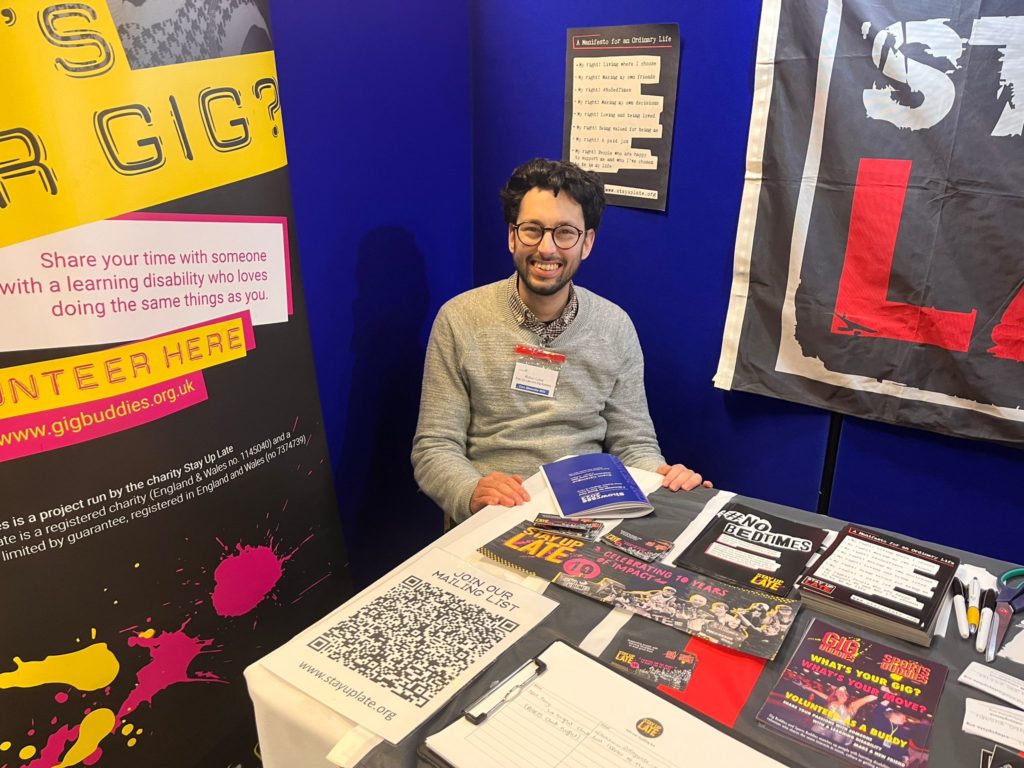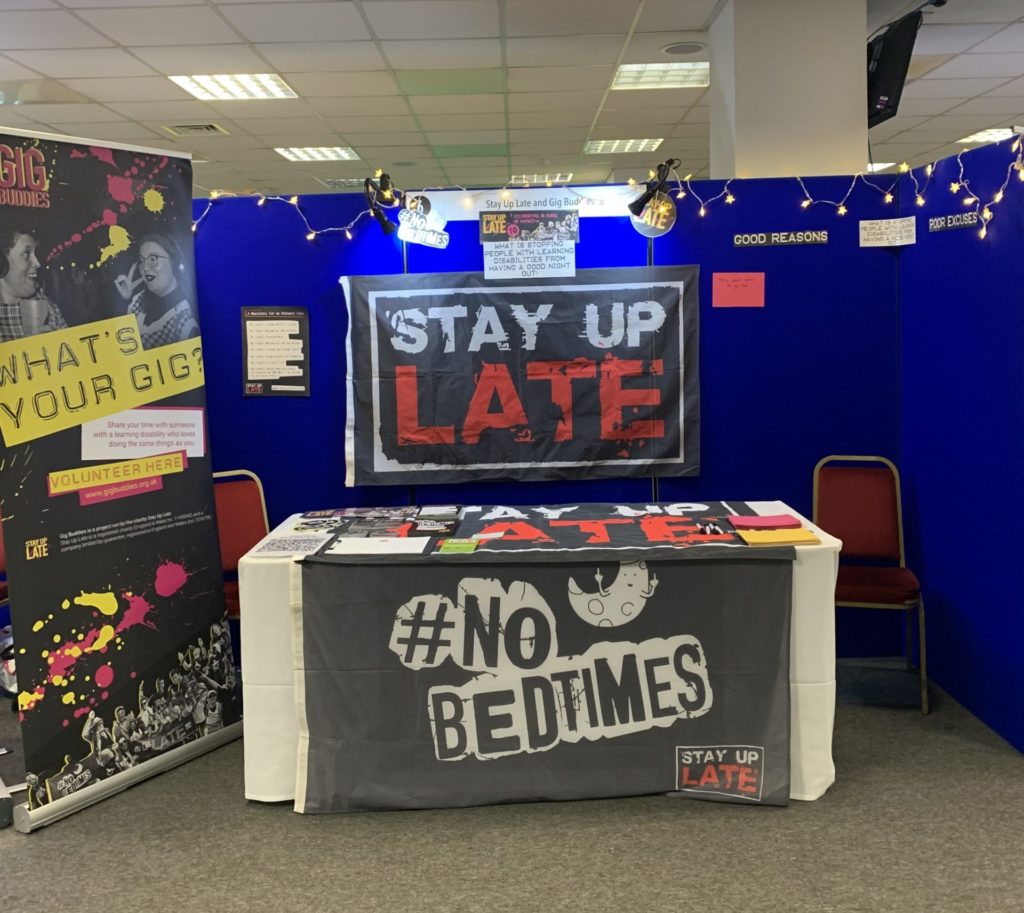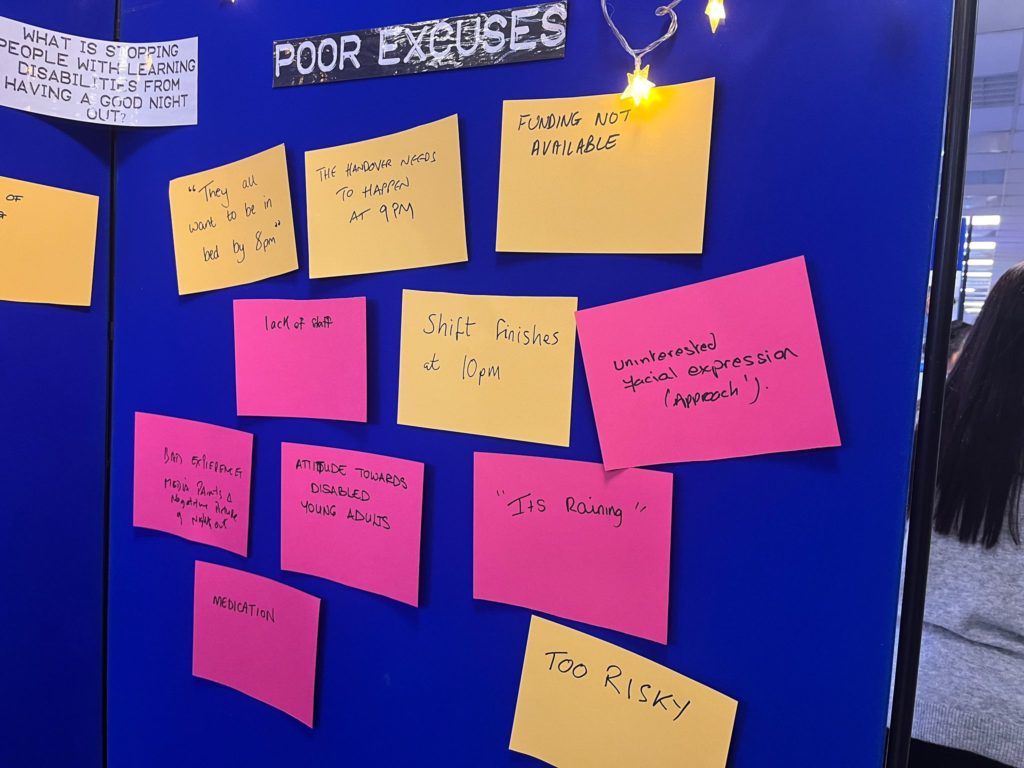
How can we get more ‘care’ into the ‘social’ side of the lives of the people we support?
How can we get more ‘care’ into the ‘social’
side of the lives of the people we support?
An opinionated summary of the social care showcase
Rohan, Paul and I went to our first care showcase since the pandemic began. We thought it was time to show our faces and shake things up. One of the main questions that comes up time and again in our campaign is how to convince people that staying up late is an important cause. Although people seem to enjoy what we do on the surface, things don’t appear to be shifting and so spending time in care spaces, speaking to those who work within the sector and can have a direct impact is important. Having conversations, even if they are uncomfortable, is important. Because as one support worker said, “we all want the same thing…”. Right?
The showcase
On the day our stall stands out. We’ve created an interactive wall of ‘good reasons’ and ‘poor excuses’ to not stay out late for people to add to, and have a moon swearing on our table cover. It feels like we don’t quite fit in. The other stalls must have all received the same memo. A smiling, ‘inspirational’ picture, some facts and, of course, free pens. Now, I don’t mean to seem rude, it was after all us that didn’t fit in, but there seemed to be an accepted and unimaginative way of operating. The stalls themselves seemed more about sales and savvy businessmen than about those that receive care. In fact, pretty much everyone I spoke to was in management or higher. Whilst these people are incredibly important and must be at these events, I also think it’s poor business, in the crudest terms, to not have your target audience present. How do we really know what people want if they’re not there? I feel it would make for a much more colourful, innovative, and exciting space if we involved everyone. As we’d have to adapt the way we communicate and create more variety. I may be wrong, it’s just a hunch, but I fear we’ve removed the human element and all that’s left is the pitch.
On the other hand, one of the first comments made about our stall was that it was eye catching, but also scary! At least we provoked some kind of emotion and I imagine us being smiley offset the worst of the fear as we attracted quite a few visitors. Lots of people expressed their joy over what we do, which is always rather lovely, but some seemed slightly unsure. Here are the reoccurring themes that came up from our experience of the day and my unsolicited thoughts on them.
(As we were running a stall we didn’t have any opportunity to hear the talks and have no doubt there will have been some great challenges and ideas in these).
Friend or Foe?
Firstly, some support workers seemed confused about our Gig Buddies project and how that related to their own jobs. Gig Buddies is just one answer to the problem of isolation many adults with learning disabilities face. Our overarching campaign is about changing the culture in care to create an enabling and empowering environment for everyone. Where the ability to choose the life you want to lead is enshrined in people’s rights and we work as a community to achieve rich and fulfilling lives. At the showcase, people asked lots of reasonable questions about Gig Buddies, but they also seemed surprised that our work centred around friendship alone.
There were three occasions where people took offence to our stance that adults with learning disabilities need people who aren’t paid to be there in their lives. They weren’t rude and they weren’t wrong to be cautious. When you try your best to support someone and feel that you’re providing friendship, I’m sure it can feel affronting to hear someone seemingly dismiss this. But this statement is not meant as a rebuff to support workers. Their jobs are incredibly important and valuable and have a place within our Gig Buddies projects as connectors and enablers, even volunteers. We need them to have a central role within our campaign to change the care culture, as they directly impact the choices and therefore quality of people’s day to day lives.
We have always been clear that our Gig Buddies project has never been about providing free support. It’s about having people in your life who aren’t paid to be there. In our opinion a support worker can’t be seen as a friend whilst they are being paid to be in someone’s life. They should be all about facilitating friendships though. Dave Hinsburger’s short but succinct video speaks nicely to this.
Which brings me to my first point, these underlying uncertainties have the power to create barriers to us all working together. We want people to have wider social circles outside their often-small inner circle. This doesn’t denigrate or negate the hard work and value of support workers; it works upon this and should make life richer for everyone involved.
The fear barrier
It’s what they’ve always known
Another ‘poor excuse’ that came up was that the people being cared for didn’t actually want to go out. Someone even wrote on our wall, “they want to be in bed by 8pm”, because this is what they were told about the people they supported. Now I, like most people, enjoy an early night and a cup of tea. However, if I was only ever allowed an early night and a cup of tea, I think I would feel rather differently about the matter. (And 8pm is incredibly early for an adult to go to bed, neurodiverse or otherwise).
The problem is complicated, because when this is all you know, maybe you do feel more comfortable in your routine and nervous about going out. Or maybe you’re tired because the support worker was told you needed to be up and showered by 7:30am and so it was an early morning all round. This then becomes a self-fulfilling prophecy with changes to the schedule feeling large and overwhelming. A common ‘good reason’ people had for not going out late was the fear and anxiety that people with learning disabilities experience as a boundary. So I began asking people whether they felt they were able to support people to overcome these anxieties. Responses were mixed but it was good to open up the space for these conversations and refocus the onus of apathy away from those we support.
Going out at night means taking risks
People also brought up the sometimes-tricky input of loved ones. Families who were either overenthusiastic about things that weren’t important to their loved one, or nervous and overprotective. Whilst both feelings are understandable, it’s important to be aware of them, normalise them and realise what is irrational. We take risks in life all the time. Going out in the evening shouldn’t be one, and we shouldn’t be asking adults with disabilities to adapt to a surrounding that isn’t safe for them. We should be changing the environment for all of us. Again, recognising the different inputs that go into supporting your loved one’s social life is a good step in being able to mitigate an overprotective or fearful approach.
To go out or not got out?
Having a positive, solution-focussed, mindset
One of the interesting outcomes of the wall was a few times people started out saying something was a good reason and by the end of the conversation, they had talked themselves out of it. One such example was poor staffing. With recruitment being at a low, it is understandable that there is more pressure on those who remain. However, the same person who brought up staffing as an issue, said they’d managed to do more with less and been forced to find ingenious ways to make things work.
We know we can find solutions to the barriers around having a good night, and sometimes we do it without really thinking. I think these conversations around poor excuses and good reasons can be helpful in shifting the narrative, reminding us that we all have a role to play in elevating the quality of life of adults with learning disabilities and/or autism.
If we spend more time discussing things that may make us uncomfortable or unsure, then good. Our attitudes are powerful and as one individual brought up maybe “there are no good reasons for people not to go out”… If you want to do something fun, why wouldn’t the person you’re supporting? At the very least you should check, who knows, work may become a bit more varied and fulfilling for everyone.
The showcase brought up a lot of the underlying things we were already aware of and helped to reinforce our focus on having these discussions, creating space for people to learn from each other and express their worries. If we all want the same thing, then let’s work together to get there.
– Florence
As ever we’d love to know your thoughts. Have you been to similar conferences or got any thoughts on the issues raised? Please post your comments below.




